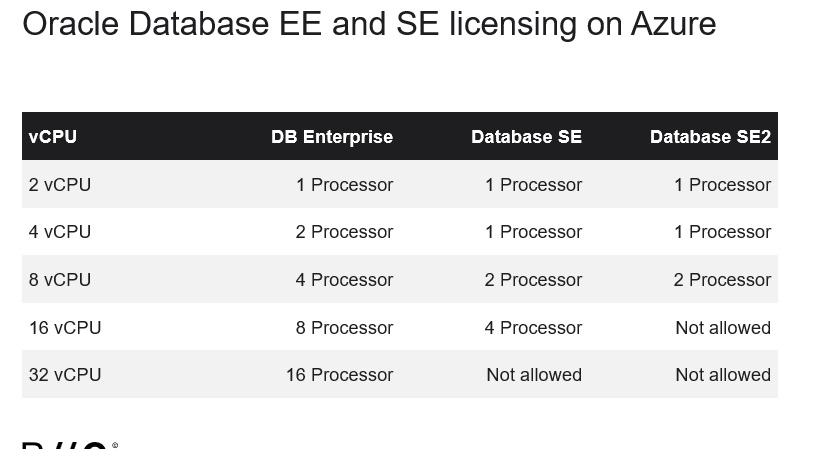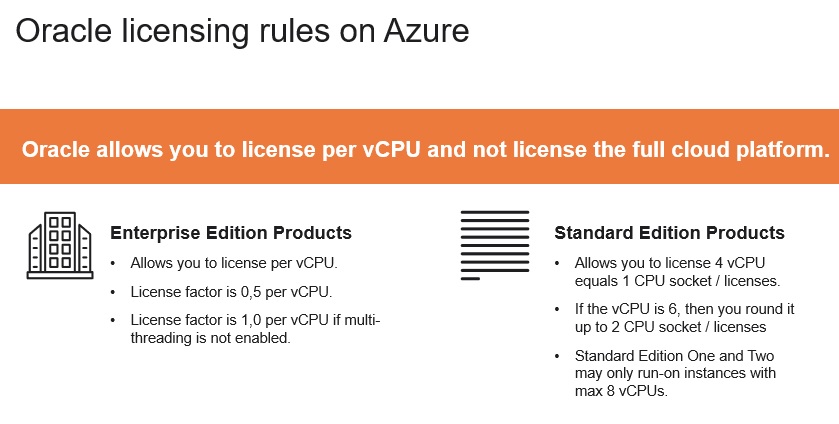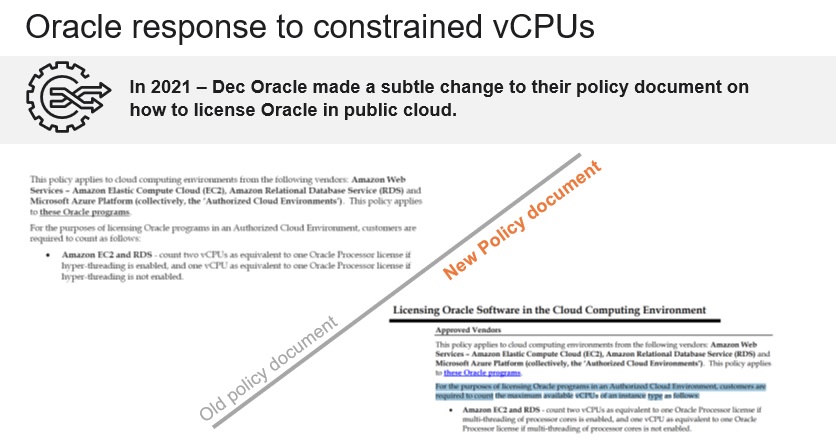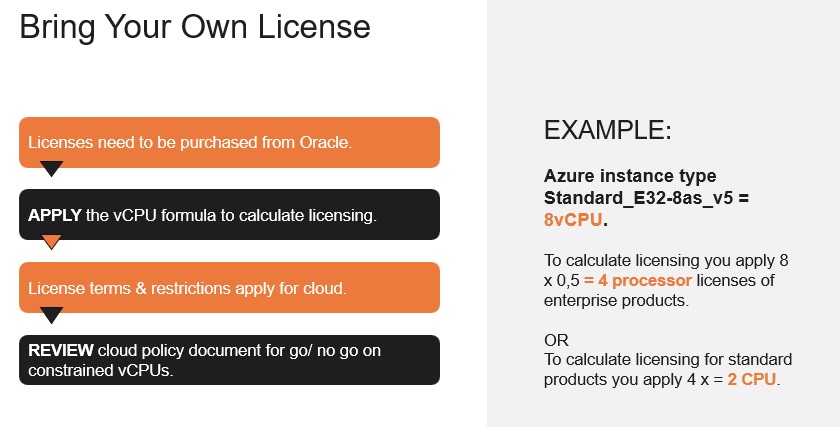
Oracle licensing on Azure – Short answer
How does Oracle licensing on Azure work? – Oracle has designated Microsoft Azure as an Authorized Public cloud platform in its policy document for licensing Oracle software in the public cloud. This means that Oracle is applying a unique licensing model to Azure, as opposed to public cloud platforms that are not authorized by Oracle. You count the vCPUs available in your instance, then multiply it by 0,5 and calculate the licensing requirements.
Oracle licensing on Azure – Longer Guide
If you are using Oracle on Azure, it is important to understand how to bring your Oracle licenses with you. The Oracle licensing guide provides guidance on importing your Oracle licenses into the cloud but does not mention which cloud vendors are approved by Oracle. If you are using a non-approved cloud environment, you will need to follow your Oracle license terms to avoid potential issues. This article discusses Oracle licensing on Azure and provides the information you need to decide whether or not to bring your licenses with you. The article also covers how to practically license Oracle on Azure.
Oracle Licensing Options in Azure

As of September 23, 2013, Microsoft has required customers to pay for Oracle software running on Windows Server in its Azure virtual machines (VMs). These VMs are available as “bring your own licensing” (BYOL) instances through the Windows Azure Gallery and have the same licensing terms as physical servers. However, Oracle has changed the way it calculates the number of CPUs for licensing purposes. Oracle estimates that a cloud environment with eight cores has the same processing power as an eight-core physical server, so the licensing for an eight-core virtual CPU (vCPU) cloud VM is equivalent to four Oracle Processor licenses.
Oracle Java Licensing on Azure
Microsoft has entered into a cloud partnership with Oracle to make its Java technology available on the Azure cloud platform. The two companies announced the partnership in June and will offer Java as a preinstalled first-class environment in both Windows Azure and its Hyper-V virtualization software. If you want to deploy Oracle Java on Azure, you apply the vCPU licensing rules for Java, and it works the same way as licensing Oracle database products.
To calculate Oracle licensing in Azure, you need to consider the following factors:
- Number of vCPUs that the Oracle software is deployed on
- Whether or not multi-threading is enabled
If multi-threading is enabled, two vCPUs count as one processor license.
Examples:
- If you are deploying Oracle Database Enterprise Edition on an eight vCPU instance, you will need four processor licenses.
- If you are running Oracle Database Enterprise Edition in Azure with hyperthreading enabled:
- Two vCPU = 1 processor license
- Four vCPU = 2 processor licenses
- Eight vCPU = 4 processor licenses
- 16 vCPU = 8 processor licenses
- If you are licensing Oracle Database Standard Edition 2:
- 2 vCPU = 1 processor
- 4 vCPU = 1 processor
- 8 vCPU = 2 processors
- Note: Standard Edition 2 may not be run on more than eight vCPUs.
Oracle License Compliance on Azure – Problems
- Check your territory clause in your Oracle Ordering Document to ensure that you are allowed to deploy Oracle in the Azure region where you plan to use it.
- Review your licensing agreement for any other restrictions that may prevent you from deploying in Microsoft Azure.
- Oracle Database Standard Edition 2 can only be licensed on an Azure instance with a maximum of 8 vCPUs.
- Under an Oracle Unlimited License Agreement (ULA), you may not be able to count Microsoft Azure deployments towards your exit numbers. Review the certification clause in your ULA for more details.
- Consider constrained vCPUs on Azure for optimizing Oracle licenses.
Constrained vCPU on Azure – Oracle license optimization

To optimize Oracle licensing on Azure, Microsoft has introduced a concept called “constrained vCPU.” This allows users to reduce the number of vCPUs in a virtual machine (VM) to as low as one-quarter of the original size, as most Oracle database workloads are not CPU intensive. According to Oracle’s cloud licensing policy, two vCPUs are equivalent to one Oracle Processor license if multi-threading is enabled, and one vCPU is equivalent to one Oracle Processor license if it is not. It is important to note that, for the purposes of licensing Oracle programs in an Authorized Cloud Environment, customers must count the maximum available vCPUs of an instance type. Some Oracle Account Teams may claim that the constrained vCPU model cannot be used to limit the number of licenses required.
How to reply to Oracle
There are several important points to consider when using constrained vCPU on Azure to optimize Oracle licensing:
- You do not need to share the instance type you are using, only the number of vCPUs.
- The Oracle cloud licensing policy document is “non-contractual,” as stated in the footnote.
- The Oracle cloud licensing policy specifies “maximum available” vCPUs, meaning that there are no additional vCPUs available to you.

Does Oracle WebLogic licensing work the same way as database?
Yes, it works the same way, you calculate using vCPUs and apply them to your licenses and deployments
Oracle EBS on Azure how does licensing work?
Oracle applications are licensed per user and or employee metrics it works the same way as it would for on premise deployment. However the technology stack database and middleware is licensed using Oracle Azure licensing rules.
Can there be restrictions in my license agreement about moving to Azure?
Yes, you need to review your licensing terms to make sure that there are no such restrictions. If there is any, you should negotiate with Oracle to allow for migration to Azure.
How our Oracle license experts can help
Our Oracle licensing services for Azure can help companies smoothly transition their Oracle investments from on-premises to the cloud. Our services include:
- Reviewing and interpreting Oracle licensing agreements to understand the terms and conditions of using Oracle software on Azure
- Identifying any potential compliance issues or areas of risk when moving Oracle to Azure
- Providing recommendations for optimizing Oracle licensing to save money on Azure
- Assisting with the process of migrating Oracle workloads to Azure, including ensuring that all necessary licenses are in place
- Providing ongoing support and guidance to ensure that the organization remains compliant with Oracle licensing rules and policies on Azure
- Assisting with the preparation and execution of Oracle audits, if necessary.
Our team of Oracle licensing experts has extensive experience working with Azure and can provide customized solutions to meet the specific needs of your organization. We are committed to helping you protect and optimize your Oracle investments on Azure